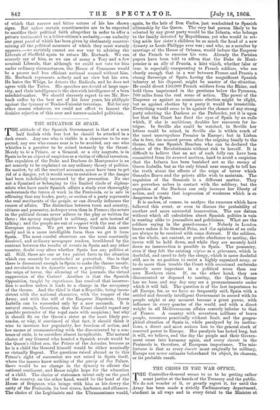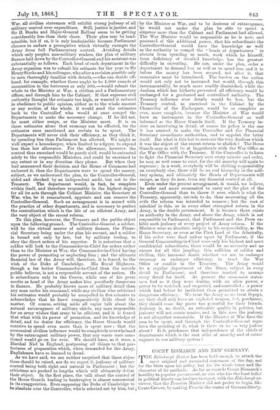THE CRISIS IN THE WAR OFFICE.
T HE Controller-General seems to us to be getting rather- ' scant justice at the hands of the Treasury and the public. We do not wonder at it, or greatly regret it, for until the Army has been made a strictly Parliamentary department,. obedient in all ways and in every detail to the Minister at. War, all civilian statesmen will exhibit strong jealousy of all military control over expenditure. Still, justice is justice, and Sir H. Storks and Major-General Balfour seem to be getting considerably less than their share. Their plan may be inad- missible, but if so, it is only inadmissible because Parliament chooses to endure a prerogative which virtually exempts the Army from full Parliamentary control. Avoiding details which only perplex non-military readers, the plan of military finance laid down by the Controller-General and his assistant was substantially as follows. Each head of each department in the Army organism was to submit his estimate for the year to Sir HenryStorks and his colleague, who after a revision possible only to men thoroughly familiar with details,—who can decide off- hand, for example, whether there ought to be 1,000 rounds of ammunition in the fortresses or only 500,—would submit the whole to the Minister at War, a civilian and a Parliamentary officer, and through him to the Cabinet. If that supreme civil authority thought the estimate too high, or wanted it reduced in obedience to public opinion, either as to the whole amount or any section of the whole, it would send the estimates back to the Controller?, who would at once compel the Departments to make the necessary change. If he did not, he must either resign, or the Minister must. It is on these estimates alone that economy can be effected, for the estimates once sanctioned are certain to be spent. The Departments will never risk their efficiency, as they think it, by spending less than Parliament has allowed. We might as well expect a housekeeper, when limited to a figure, to expend less than her allowance. For the allowance, however, the control thus exercised would be purely civil, would be entrusted solely to the responsible Ministers, and could be exercised to any extent or in any direction they please. But when they had announced their decision, and the House of Commons had endorsed it, then the Departments were to spend the money, subject, as we understand the plan, to the Controller-General, aided and checked by an independent audit, but not to the Treasury. The department would, in fact, be complete within itself, and therefore responsible in the highest degree for all its acts through the Cabinet Minister, the Secretary at War, who, be it remembered, appoints and can remove the Controller-General. Such an arrangement is in accord with the practice of other departments, and is necessary to perfect the centralization which is the life of an efficient Army, and the very object of the recent reform.
To this plan, however, the Treasury and the public object upon the following ground. The Controller-General, a soldier, will be the virtual master of military finance, the Finan- cial Secretary being under the plan his servant, and a soldier is bound not only by law, but by military feeling, to obey the direct orders of his superior. It is notorious that a soldier will look to the Commander-in-Chief for orders rather than to the Minister at War, the Commander-in-Chief having the power of promoting or neglecting him ; and the ultimate financial law of the Army will, therefore, it is feared, be the wish of the Duke of Cambridge. His Royal Highness, though a far better Commander-in-Chief, than the outside public believes, is not a responsible servant of the nation. He is subordinate only to the Crown, while one of his great merits as head of the Army makes him peculiarly dangerous in finance. He probably knows more of military detail than any man under his command, while any civilian who criticized his estimates would probably be compelled in five minutes to acknowledge that he knew comparatively little about the matter. Of course, setting aside all vague talk about the natural extravagance of military chiefs, any man responsible for an army wishes that army to be efficient, and it is feared that what with its power of promotion, and its knowledge of detail, and its desire for efficiency, the Horse Guards would contrive to spend even more than is spent now ; that the economical civilian influence would be completely overwhelmed by the extravagant military power, that any waste once sanc- tioned would go on for ever. We should have, as it were, a Marshal Niel in England, postponing all things to that per- fectness of preparation which, when demanded for the Army, Englishmen have so learned to dread.
As we have said, we are neither surprised that these objec- 1IIE Edinburgh Review has been bold enough to attack the tions should be raised, nor do we regret it, jealousy of military I most original and successful statesman of the day, not control being both right and natural in Parliament ; but the for the blots upon his policy, but for its whole tenor and the criticisms are pushed to lengths which will ultimately defeat character of its methods. As far as regards Count Bismarck's their object. In the first place, the talk about the control of hostility to popular government, no one who has the least belief its exaggeration. Even supposing the Duke of Cambridge to viewer, that the Prussian Minister did not prefer to begin, like the Horse Guards leading to bankruptcy is almost nonsensical in political liberty can hesitate to regret, with the Edinburgh re-
m ri be absolute over the Controller, who is selected not by him, but Count Cavour, by making Prussia the centre of German liberty,
by the Minister at War, and to be desirous of extravagance, he would not under the plan be able to spend a sixpence more than the Cabinet and Parliament had allowed. The War Minister would be responsible as he is now, and possessed of this additional power, that his subordinate the Controller-General would have the knowledge as well as the authority to compel the "heads of departments" to abstain from spending so much, work which he himself, from deficiency of detailed knowledge, has the greatest difficulty in executing. He can, under the plan, order a department to demand less as well as to spend less, and it is before the money has been secured, not after it, that economies must be introduced. The burden on the nation would not only not be increased, but would, through this instrumentality, be much more readily diminished, while the dualism which has hitherto prevented all efficiency would be exchanged for a graduated and centralized authority. The Treasury influence over details would be less, but the Treasury control, as exercised in the Cabinet by the Chancellor of the Exchequer, would be as complete as ever, more complete, because the Minister at War would have an instrument in the Controller-General as well informed as the Horse Guards itself. If the Treasury in- sists on interfering in detail, of course its policy is the one it has avowed, to make the Controller and the Financial Secretary co-ordinate authorities, and to appoint the latter itself. But what is this but to recreate the very dualism which it was the object of the recent reform to abolish ? The Horse Guards may as well be at loggerheads with the War Office as the War Office with the Treasury. If the Controller is to have to fight the Financial Secretary over every minute and order, he may as well cease to exist, for the old anarchy will again be supreme ; in a week, everybody will be shifting responsibility on everybody else, there will be no real hierarchy in the mili- tary system, and ultimately the Heads of Departments will escape, as they do now, from any financial control at all.
Even under the present arrangement, it would, we believe, be safer and more economical to carry out the plan of the Controller-General than to throw it over, which is what the Treasury, apparently, intends to do, thus re-creating all the evils the reform was intended to remove ; but the root of mischief in this, as in every other attempted reform in the Army, is the double government. It is because there exists an authority in the Army, and above the Army, which is not responsible to Parliament, that Parliament and the Press ex- hibit such jealousy of every project of Army reform. If the Minister were as absolute, subject to his responsibility, as the Home Secretary, or even as the First Lord of the Admiralty, if his order were final unless upset by Parliament, if the General Commanding-in-Chief were only his highest and most confidential subordinate, there would be no necessity and no excuse for all this jangling, this collision of soldier and civilian, this incessant doubt whether we are to endanger economy or endanger efficiency, to trust the War
Office or confide in the Treasury. The Army would be a regular department of the State, subject in every detail to Parliament, and therefore trusted to manage every detail for itself. At present the economist states- men feel as if they were dealing with an alien power, a power to be watched, and suspected, and controlled ; a power which had better be inefficient than permitted to attain a dangerous efficiency. We treat the Army as we treat Sepoys, say they shall only have an exploded weapon, lest, perchance, they should some day prove too powerful for their friends. Jealousy is, no doubt, an estimable quality in politics, but jealousy will not create armies, and in this case the jealousy is not altogether reasonable. If the Minister at War fixes the sum to be spent, and through the Controller-General regu- lates the spending of it, what is there to be so very jealous about? Is it, perchance, that independence of the chiefs of departments which is the root alike of anarchy and of extra- vagance in our military system ?































 Previous page
Previous page